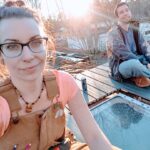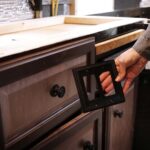Building Non-Traditional Homes
Jes was studying to become a real estate agent when she first started thinking about buying a home. She and her partner Derek started looking at options. It was a seller’s market. “I realized when the market bottomed out, we would be stuck,” she explained. They were hesitant to go into debt to be in a situation that limited their life choices.
Derek related the moment they realized a traditional home wasn’t what they were looking for. They had kayaked out to an island when they observed someone working for the state. His job was kayaking from rain gauge to rain gauge, checking for mosquitos. “And we said — ‘How can we do that?!’ We want the freedom to do things like work-camping, art, and woodworking for a living. We had to bring our overhead down. We want to collect experiences, not stuff.”
They started looking at RVs. They were astounded to see how much they cost. Then they stumbled across school bus living. “Schoolies were the perfect medium,” effused Jes. They could build their own home suitable for the lifestyle they wanted and the few possessions they needed. And they could do it at a fraction of the cost of a traditional home.
Almost everything for the bus has been purchased from the ReStore, found on Craigslist, or salvaged. They listed their ReStore finds: wiring, speakers, hand tools, zip ties, tile, bathroom vanity, countertops, shower base, mantles, flooring, and more. They emphasize how the ReStore has helped them build a home for the lifestyle they aspire to have.
They describe the key to finding inexpensive materials: know what you’re looking for and then acquire it as you have the opportunity. Each week, they visit the ReStore with a list and grab what they can find. They consider ways to repurpose available materials. Their favorite find is a century old wood stove they named Marge.
It’s taken them about two years to transition. “We’re minimalist compared to mainstream society, but it’s still a journey,” divulged Jes. Everything that goes onto the bus is multipurpose because of the space limitations. Their priority is space for tools, so they can jump on opportunities for work.
Derek describes the skills he has learned from working on the bus. “It broadened our horizons quickly,” he laughed. “We had to learn tile, welding, plumbing, electrical.” They plan to use these skills as career paths.
“We believe in working hard for what we want,” Jes said. Derek adds, “We are building this with our own two hands.”






